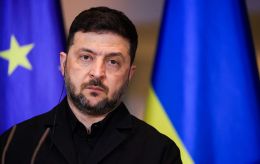Six European countries and EU sign Berlin declaration on Ukraine
 Photo: Six European countries and the EU signed the Berlin Declaration on Ukraine (Getty Images)
Photo: Six European countries and the EU signed the Berlin Declaration on Ukraine (Getty Images)
A meeting of the foreign ministers of the UK, Spain, Italy, Germany, Poland, France, Ukraine, and the EU's High Representative for Foreign Affairs and Security Policy took place in Berlin. Following the meeting, the ministers adopted the Berlin Declaration, according to the website of Ukraine's Ministry of Foreign Affairs (MFA).
The MFA explained that the Berlin Declaration reaffirmed the strong solidarity and resolute support for Ukraine by its partners at this turning point of confrontation with Russian aggression.
"Key elements of the document include the clear statement that the goal of these efforts is Ukraine's victory. The document emphasizes that peace negotiations for Ukraine cannot be conducted without Ukraine or without Europeans on its side," the Ministry added.
The ministers also confirmed that the stability of European security is inseparably linked to the restoration of comprehensive, just, and lasting peace for Ukraine based on international law, including the UN Charter, with full respect for Ukraine’s sovereignty and territorial integrity.
"Importantly, the document expresses continued support for the Peace Formula as a reliable pathway to such peace," the MFA stated.
According to the MFA, the Berlin Declaration clearly emphasizes the partners' support for Ukraine on its irreversible path to full Euro-Atlantic integration, including NATO membership, as well as its path to EU accession.
The ministers also emphasized their readiness to increase military, economic, and financial assistance to Ukraine, including the mobilization of additional European funding. They also expressed their commitment to swiftly implement the G7 decision to allocate $50 billion in loans to Ukraine to meet its urgent needs, including military needs.
What else does the Berlin Declaration affirm
The document emphasizes support for Ukraine's right to self-defense against Russian aggression and strongly condemns further escalation by Russia.
The Declaration confirms the intention to continue to limit the build-up of Russian military capabilities and put additional pressure on the Kremlin's sources of revenue, including energy, as well as the readiness to provide Ukraine with strong security guarantees, including reliable long-term military and financial support.
Meanwhile, the ministers demonstrated their readiness to unite with European and transatlantic partners in discussions and actions on European security, which must be based on the principles of the UN Charter and the OSCE.

